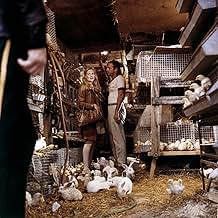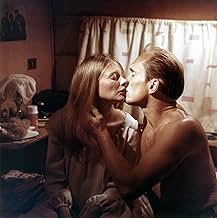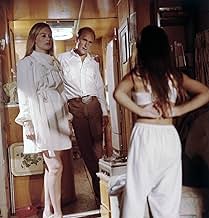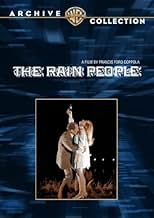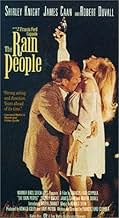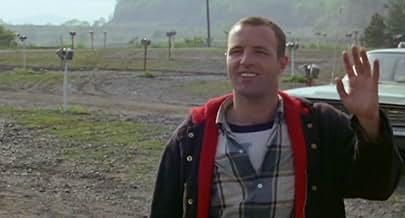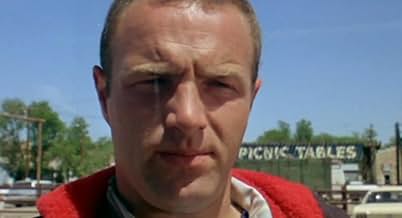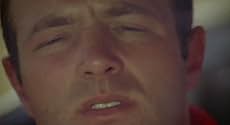CALIFICACIÓN DE IMDb
6.8/10
4.4 k
TU CALIFICACIÓN
Una mujer embarazada se da a la fuga para obtener un poco de libertad y reevaluar sus elecciones vitales.Una mujer embarazada se da a la fuga para obtener un poco de libertad y reevaluar sus elecciones vitales.Una mujer embarazada se da a la fuga para obtener un poco de libertad y reevaluar sus elecciones vitales.
- Dirección
- Guionista
- Elenco
- Premios
- 1 premio ganado en total
Laura Crews
- Ellen
- (as Laurie Crews)
Garrett Cassell
- Farmer
- (sin créditos)
Eleanor Coppola
- Gordon's Wife
- (sin créditos)
- Dirección
- Guionista
- Todo el elenco y el equipo
- Producción, taquilla y más en IMDbPro
Opiniones destacadas
Of all his films it would appear that Francis Ford Coppola is particularly fond of "The Rain People", a very modest and some might say 'arty' drama he made early in his career. Like a lot of American films popular at the time it's a 'road movie' with Shirley Knight as the young wife who ups and leaves her husband in the middle of the night, gets in her car and drives West for no paricular reason she can think of, meeting on her journey James Caan, (brain-damaged football player), and Robert Duvall, (randy motorcycle cop). She also happens to be pregnant and, like so many Americans in movies at the time, has gone off to 'find herself'.
Coppola says it was a personal project and there are some people who think it's his first masterpiece but it wasn't a hit and despite Coppola's name on the credits has become something of a lost movie. Knight is excellent as she mopes about and, you might say, teasing any man who comes her way while Duvall and especially Caan match her at every turn. You could say it's a quintessential American film of its time, a 'movie-brat' movie if there ever was one and Coppola's first real 'signature' picture, (though I do have a soft-spot for the wonderful "Finian's Rainbow" which preceeded it). If you do get a chance to track this down it is certainly well worth seeing.
Coppola says it was a personal project and there are some people who think it's his first masterpiece but it wasn't a hit and despite Coppola's name on the credits has become something of a lost movie. Knight is excellent as she mopes about and, you might say, teasing any man who comes her way while Duvall and especially Caan match her at every turn. You could say it's a quintessential American film of its time, a 'movie-brat' movie if there ever was one and Coppola's first real 'signature' picture, (though I do have a soft-spot for the wonderful "Finian's Rainbow" which preceeded it). If you do get a chance to track this down it is certainly well worth seeing.
Francis Ford Coppola's first 'personal' film, completed and released in 1969, was the last movie he made as a mostly unknown, up and coming director before The Godfather, and is in stark contrast to both that film, and the rest of his uneven career. It's ostensibly a road movie involving a disconnected young woman bored with domestic life, and pregnant with a child she isn't sure she wants, fleeing the trappings her dull marriage and hitting the open road in search of freedom. Along the way she befriends a nice man, an ex-footballer player that suffered brain damage from a traumatic head injury, played in unexpectedly subtle fashion by a young James Caan, and decides to 'help' him, despite becoming frustrated with his simple ways. Her efforts to rid of him always fail, either by guilt or chance, and eventually lead her directly into the hands of an emotionally wounded cop(Robert Duvall), who has ideas of his own. The plot is threadbare, but Coppola does a great job at detailing the emotional life of these characters, and uses editing techniques to relay back story that were not at all common in American films of the time. Shots are simple, yet extraordinarily effective, conveying both the moody desolation of the open highway, and the emptiness of American suburban life, infused with a gentle melancholy provided by the film score. Coppola also deserves credit for addressing the issue of domestic discontent from a woman's point of view in the culturally turbulent 60's. Overall, a fairly low-key film that is not what audiences have come to expect from Coppola, but one that is a minor triumph in its own quiet, unassuming way. 7.5/10.
In some scenes in the Rain People, Francis Ford Coppola's precursor to his hey-day of the seventies, there is the mark of a similar situation to 1969's Easy Rider, but not exactly in the same reference frame. Here we have a drama about disconnected people from society, in some ways alienated by the choices or by limits imposed by one mean or another. It's one of those rare original dramas where some scenes stand alone as total knockouts.
Even with such a low-string budget and a very freewheeling, so to speak, attitude about filming the movie, Coppola is able to capture everything that needs to be said through these clearly defined characters and the curved, unexpected degrees of one character versus the helplessness of another, or vice versa, or both. And, as one might be inclined seeing as how it is very much about the cutaways of suburban life of the 1960s, it has that escapism of the film mentioned before, but of a more concrete, near timeless quality with the drama and the underlying issues. In a way, if Bergman were on route as a quasi-guerrilla 20-something filmmaker out to get the strange truths of everyday outsiders, this might be it.
But along with all of the very direct and sometimes self-conscious photography (though also with a more documentary approach at times, akin with its indeterminable characters), the actors all fit into place. Shirley Knight, an actress I'm not too familiar with, has a complex, diverging role as a pregnant wife running off in a sort of existentialist conundrum of what life is there to have. There are moments of some awe-inspiring acting by her, and one of my favorites (if not my favorite) is when she is on the telephone calling her husband the first time. Such a tense scene on both ends, and in every small gesture and inflection of a word so much about her is spoken with so little.
It's extraordinary in ways that mirror others in Coppola's films. Then comes in the character of 'killer' played by James Caan. This, too, is a dangerous character to take on, as it is a mix of childish bewilderment and amusement with scarred memories. Think Forrest Gump if he didn't make it past the football and wit. It's one of his best, actually, by being the most minimalist- for a guy who's usually playing tough guys in movies, here's one that also is part of the crux of the story and of Knight's character. Also very good in a supporting role is Robert Duvall as a cop with a rough side and rather checkered past; kind of an early sample of other defected characters he would play later on in his career.
So the characters, and what Coppola risks in having an uneasiness running in them, are really what make up the film, as whatever story there is it is definitely not resolved in the usual way you might think or expect. The last ten or so minutes are like others in Coppola's work, where the specific tragedies on all sides are undercut by the emotional- and psychological- implications this will leave on the principles are amplified to the sublime and sad.
This is, for its time, brave on the part of what is trying to be represented (in both the freedom as well as the flaws and ambiguities) in the subject matter. And the style of the picture adds a fragmented kind of view onto it all with quick flashbacks that are graphic and self-contained in a contrast with the longer shots in some crucial scenes. It's a road movie of its period, but its also got a lot more working than it would under another filmmaker with less chances to take on the nature of these outcast characters. One of the best films of 1969.
Even with such a low-string budget and a very freewheeling, so to speak, attitude about filming the movie, Coppola is able to capture everything that needs to be said through these clearly defined characters and the curved, unexpected degrees of one character versus the helplessness of another, or vice versa, or both. And, as one might be inclined seeing as how it is very much about the cutaways of suburban life of the 1960s, it has that escapism of the film mentioned before, but of a more concrete, near timeless quality with the drama and the underlying issues. In a way, if Bergman were on route as a quasi-guerrilla 20-something filmmaker out to get the strange truths of everyday outsiders, this might be it.
But along with all of the very direct and sometimes self-conscious photography (though also with a more documentary approach at times, akin with its indeterminable characters), the actors all fit into place. Shirley Knight, an actress I'm not too familiar with, has a complex, diverging role as a pregnant wife running off in a sort of existentialist conundrum of what life is there to have. There are moments of some awe-inspiring acting by her, and one of my favorites (if not my favorite) is when she is on the telephone calling her husband the first time. Such a tense scene on both ends, and in every small gesture and inflection of a word so much about her is spoken with so little.
It's extraordinary in ways that mirror others in Coppola's films. Then comes in the character of 'killer' played by James Caan. This, too, is a dangerous character to take on, as it is a mix of childish bewilderment and amusement with scarred memories. Think Forrest Gump if he didn't make it past the football and wit. It's one of his best, actually, by being the most minimalist- for a guy who's usually playing tough guys in movies, here's one that also is part of the crux of the story and of Knight's character. Also very good in a supporting role is Robert Duvall as a cop with a rough side and rather checkered past; kind of an early sample of other defected characters he would play later on in his career.
So the characters, and what Coppola risks in having an uneasiness running in them, are really what make up the film, as whatever story there is it is definitely not resolved in the usual way you might think or expect. The last ten or so minutes are like others in Coppola's work, where the specific tragedies on all sides are undercut by the emotional- and psychological- implications this will leave on the principles are amplified to the sublime and sad.
This is, for its time, brave on the part of what is trying to be represented (in both the freedom as well as the flaws and ambiguities) in the subject matter. And the style of the picture adds a fragmented kind of view onto it all with quick flashbacks that are graphic and self-contained in a contrast with the longer shots in some crucial scenes. It's a road movie of its period, but its also got a lot more working than it would under another filmmaker with less chances to take on the nature of these outcast characters. One of the best films of 1969.
Shirley Knight plays Sara Ravenna, a Long Island housewife who runs away from her marriage when she discovers she is pregnant. She plans to drive into America's heartland and start anew. Along the way she picks up a friendly hitchhiker (James Caan) who calls himself 'Killer.' Soon she discovers that the good natured 'Killer' is actually brain damaged, and by picking him up she has unknowingly taken on a huge responsibility. The two of them drive all the way to Nebraska, where Sara gets Killer a job helping out at a roadside reptile farm. It is here that Sara meets Gordon, a local cop, and soon things go horribly wrong for everyone.
This is a powerful drama about people disconnected from society, alienated by the choices they make or by the limits imposed on them by others. Even with such a low budget and a very freewheeling attitude, the film is able to capture everything that needs to be said through these clearly defined characters. Shirley Knight has a complex, diverging role and there are moments of some awe-inspiring acting by her. One of my favorites is when she is on the telephone calling her home to her worried husband the first time. It is such a tense scene on both ends, and in every small gesture and inflection of a word, so much about her is spoken with so little. Then comes in the character of 'Killer' played by James Caan. This character is unlike any I've ever seen him play, and he performs wonderfully. It's one of his best performances as he is very restrained and moving.
The way Coppola develops the characters by using short, dream-like flashbacks is very clever, adding a fragmented kind of view onto it all. The quick flashbacks that are graphic and self-contained contrast well with the longer shots in some crucial scenes. Also, because this film was shot on location all over the Eastern U.S., it offers an interesting, authentic look at America in the late 1960's.
I haven't seen many other films starring Ms. Knight, I'm only familiar with her more recent work on television, usually playing a nagging mother in law or a dotty old woman. It was great seeing her so young, beautiful, and so wonderfully subtle in this movie. It's also kind of a shame that James Caan went on to be typecast as the 'tough guy' for the rest of his career, because this film evidenced that he is capable of so much more than that.
This is a powerful drama about people disconnected from society, alienated by the choices they make or by the limits imposed on them by others. Even with such a low budget and a very freewheeling attitude, the film is able to capture everything that needs to be said through these clearly defined characters. Shirley Knight has a complex, diverging role and there are moments of some awe-inspiring acting by her. One of my favorites is when she is on the telephone calling her home to her worried husband the first time. It is such a tense scene on both ends, and in every small gesture and inflection of a word, so much about her is spoken with so little. Then comes in the character of 'Killer' played by James Caan. This character is unlike any I've ever seen him play, and he performs wonderfully. It's one of his best performances as he is very restrained and moving.
The way Coppola develops the characters by using short, dream-like flashbacks is very clever, adding a fragmented kind of view onto it all. The quick flashbacks that are graphic and self-contained contrast well with the longer shots in some crucial scenes. Also, because this film was shot on location all over the Eastern U.S., it offers an interesting, authentic look at America in the late 1960's.
I haven't seen many other films starring Ms. Knight, I'm only familiar with her more recent work on television, usually playing a nagging mother in law or a dotty old woman. It was great seeing her so young, beautiful, and so wonderfully subtle in this movie. It's also kind of a shame that James Caan went on to be typecast as the 'tough guy' for the rest of his career, because this film evidenced that he is capable of so much more than that.
I have a letter from Ms. Knight, who went to college with my older sister. In it, she tells of the hardships of making this film. She, herself, was pregnant--an interesting conjunction with the movie's plot--and the novice director was unsure, fairly green, and having great difficulties with all the decisions, logistics, etc. They were on the move all the time, and it was a very difficult shoot.
The film, however, with a strong debut for James Caan, remains effective and affecting. It's a great showcase for the talent that Ms. Knight has demonstrated her entire career--on television, in movies and on the stage, where she won the Tony for "Kennedy's Children."
This film has aged well.
The film, however, with a strong debut for James Caan, remains effective and affecting. It's a great showcase for the talent that Ms. Knight has demonstrated her entire career--on television, in movies and on the stage, where she won the Tony for "Kennedy's Children."
This film has aged well.
¿Sabías que…?
- TriviaThe parade scene was filmed in Chattanooga, Tennessee on Memorial Day. The students in the band were not aware of what was happening. In fact, reading the lips of a majorette, she can be seen asking, "Who was that guy?" as James Caan was weaving through the parade.
- ErroresWhen Natalie first leaves her husband, she drives into a tunnel and emerges from on the west side of Manhattan. That is, she has driven east through the Lincoln Tunnel, presumably heading east. But immediately after, she stops at a phone booth to call her husband, saying she is in Pennsylvania, which is in the opposite direction. Had the intention to suggest a westward journey, she could have driven west through the tunnel to emerge in New Jersey.
- Citas
Natalie Ravenna: You are the most obedient man I've ever met in my life. Look at me. Aren't you?
Jimmy Kilgannon: Yes.
Natalie Ravenna: Aren't you?
Jimmy Kilgannon: Yes.
Natalie Ravenna: Aren't you?
Jimmy Kilgannon: Yes.
Natalie Ravenna: Aren't you?
Jimmy Kilgannon: Yes.
Natalie Ravenna: Alright.
- ConexionesEdited into Filmmaker (1968)
Selecciones populares
Inicia sesión para calificar y agrega a la lista de videos para obtener recomendaciones personalizadas
- How long is The Rain People?Con tecnología de Alexa
Detalles
- Fecha de lanzamiento
- País de origen
- Idioma
- También se conoce como
- The Rain People
- Locaciones de filmación
- Chattanooga, Tennessee, Estados Unidos(Veterans Day parade)
- Productoras
- Ver más créditos de la compañía en IMDbPro
Taquilla
- Presupuesto
- USD 750,000 (estimado)
Contribuir a esta página
Sugiere una edición o agrega el contenido que falta

Principales brechas de datos
By what name was Dos almas en pugna (1969) officially released in India in English?
Responda

